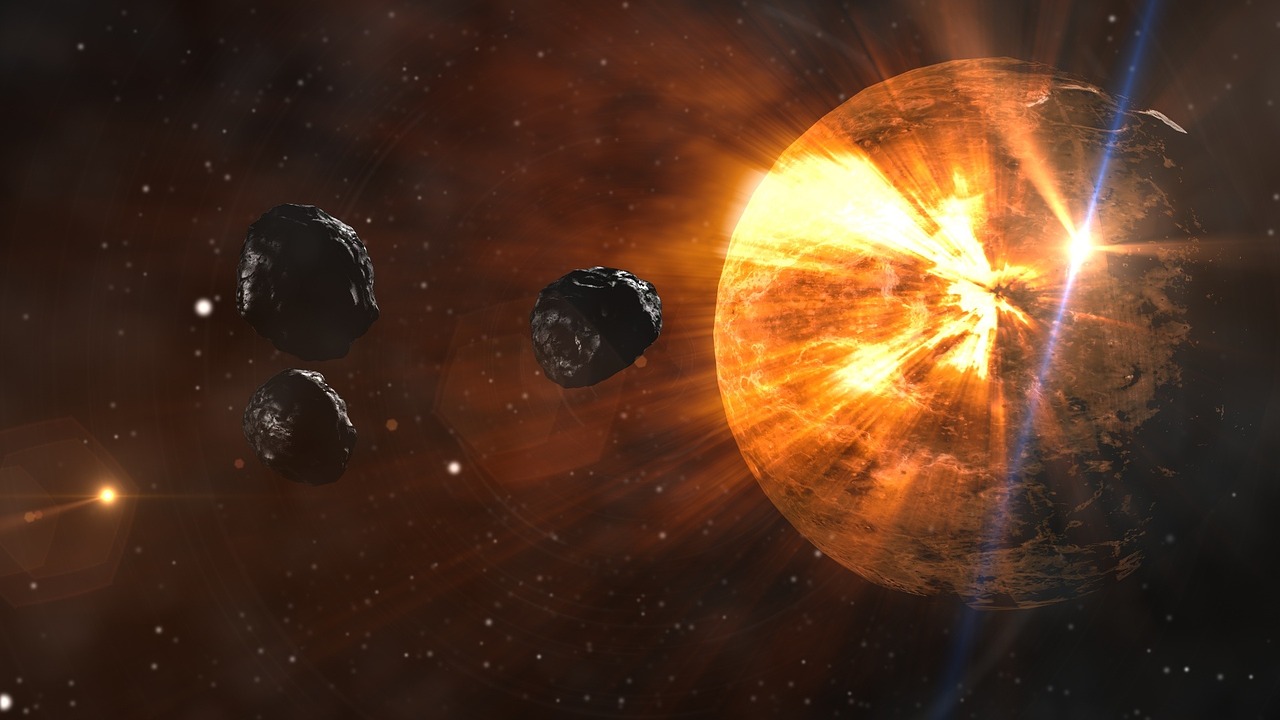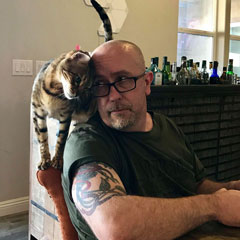
Armchair Awe for Ardent Atheists

“To the Navigators.”
An amber droplet of Tequila glistens in his grey beard and he smacks his lips wetly, appreciatively. He slams the shot glass down on the hood of his dusty pickup, alongside the four that went before. Rheumy eyes, half concealed under bushy eyebrows, appraise me.
“To the Navigators”, I repeat obediently. I lift the glass, touch it to my lips and hesitate.
“Drink it”.
The fluid slides from the upturned glass to my lips, and floods my mouth. Slippery, it coats my tongue, then lazily it oozes down. I swallow, trying to be rid of the stickiness; the unwanted, lingering sweetness, but it is inside me now.
Next to him in the front seat of the pickup, I touch my head to the glass, and watch as the jungle swallows us. It’s on the other side of sunset and the thick, full green leaves are becoming shadows. Branches weighed down with swollen, pendulous fruit stretch across the narrow dirt track, and thump wetly against the window. Their juices slide down the glass as we jolt and judder our way forward, deeper and yet deeper into the jungle. Every bump in the road brings the taste of liquor rushing back to my mouth and I struggle against the nausea.
Years ago, I was a young man working out in the Pacific Islands as a development worker. I loved my job. I felt I was making a difference. I met a constant stream of amazing, colorful people. And if I’m honest, the hard conditions appealed to the martyr in me, afflicted as I was at the time with an all-pervasive Protestant Christian work ethic. Do good works, I had always been taught.
I’d probably been out there a few years longer than I should have when I met Bruce.
Bruce was a superstitious man.
“... found ‘em in a hole. All four of ‘em”
I clench my teeth and try to listen and understand what he is saying to me. His American drawl must once have stood out stark against the halting roundness of Islander English, but now it is softened like a pebble on a beach, and I struggle with his half-formed sounds and the growing numbness.
I turn to face him and notice that scar again. It’s a mottled and angry red, perhaps from the tequila. I find myself curious about it, just as I am about the path that led him to be living deep in a jungle. What would he do if I asked him about where that angry line came from? I push back the shadows and fulfill my part of the script.
“Found who?”
“My kids, mate, my kids.”
His “mate” is spoken with a broad and exaggerated mockery of my Australian accent.
It’s hot. I feel sick. My stomach lurches as we bump our way forward. I ball my fingers into a fist, digging my fingernails into my palm as I struggle to contain the growing irritation.
“Right when I first came here. Years back. Almost as young as you, I was. I bought this land to build my house for my family. I just came in chopping, chopping, like... like I owned the place.” He makes a vague chopping gesture, and glances across at me to be sure I understand and am paying attention. I nod.
“I angered the gods, .... mate. So they put them down a ... dark hole. It was to teach me a lesson ... in respect. That’s why we drink.”
The small cabin of the pickup feels too crowded; filled to overflowing with the fumes of alcohol; with the sour smell of our combined sweat; with his sourness toward me. For a wild moment I picture throwing the door open, leaping free and running back along the jungle path.
“The ... Navigators took your kids?”
He just nods, winds down the window and spits.
I’m not exactly sure why I considered Bruce a friend. I’m not sure I actually did consider him a friend.
He was a grizzled old man with a long beard and a livid scar on his neck from a knife fight, years ago. He believed passionately in The Navigators, spirits who inhabited the jungle surrounding his home. I was young and naive, dragging my Christianity behind me like a battered suitcase missing a wheel.
It’s odd that we had much to say to one another.
Yet from the chance moment we met on a rainy beach until the last moment I saw him, we had one protracted and painful conversation. About faith I guess. Or more accurately, about why we believed what we believed.
“We’re here”.
The car shudders to a standstill. A dark wooden and corrugated iron structure greets us, the small patches of yellow light bleeding from its curtained windows holding back the night, but barely. Somehow the house itself is indistinct, its edges bleeding into the nightmare of vines encasing it. All that defines it as separate is that thin light.
Beyond it, the darkness and the jungle are absolute. No other spark shines out of that void. There are no neighbors here. The house, and the small family within it, is alone.
I step out of the car, and immediately the jungle night soaks into my skin. Its smell surrounds me; sweet, ripe and rotting. As I follow Bruce’s lanky silhouette along the path to his front door, my feet sink into the muddy earth, sucking at my shoes, then swallowing my feet whole.
Ahead of me, his voice muted by the saturated air, I hear Bruce chuckle softly.
The truth is, this devotion and fear he felt for these ridiculous Navigator spirits made me feel sorry for him. Looking back on it, I think that’s why he could never let it go, this conversation of ours.
His beliefs were just bizarre superstitions that had bubbled up out of his subconscious and overwhelmed his life. He was a sick man and needed help. My beliefs on the other hand were a carefully tended set of principles based on a well-documented, magnanimous god. I could help him.
That was how I saw it.
“This is where you’ll sit”
His hand is at my shoulder pressing me into a faded damp armchair. Jungle vines surround and strangle the small wooden deck. Distended, heavy fruit hang above us, swaying in the night breeze. The night crawls with creatures that scrape, scuttle and fly about us. I see them traversing the walls, dripping from the leaves.
Silently, his family arrive. I am only dimly aware of them at first. They emerge as shadows, finding a place at the edge of the light where the jungle begins. I only see glimpses of their coffee colored skin, their faded clothing and tangles of black, unkempt hair. Occasionally I catch sight of shy, sullen eyes. In those moments, I see how they must see me; a drunken white man with mud-caked feet, face glistening with sweat.
Two young boys, perhaps six and seven years old, sit close to one another, their knees touching. Two older girls, perhaps in their early teens sit further apart and deeper in the shadows. One of the girls reaches up into the vines overhead, plucking a swollen, bulbous fruit. The vine shudders as she pulls it free and I hear her teeth tearing into its flesh.
Bruce drags an old armchair across the deck to face mine. He folds himself into it and when he is settled he grins across at me, gap-toothed and predatory.
I start back in my chair. I realize my heart is pounding. We are silent as Bruce splashes yet more tequila into our glasses.
“I can’t Bruce. I can barely see. Please...”
He grasps my hand and wraps my fingers around the glass. “To the Navigators.”
I sigh and empty the glass. “To the Navigators”.
The jungle sounds settle back into a rhythm and the two small boys are huddled close together now, their arms wrapped around one another. I can see that the smaller has his face buried in the shoulder of the larger boy. The two girls are still there, but they are wrapped yet deeper in shadow. They are motionless. I wonder if they are frightened, those children transfixed between the wavering pool of light and the impenetrable shadow beyond it. Bruce is leaning back in his armchair, his hand resting slackly about the neck of his tequila bottle.
“Who are they? Who are the Navigators?” I ask.
Bruce’s face emerges from shadow. He places his hands on my knees, resting his weight on them as he leans forward until his face occupies my whole vision. I move away, but he follows. He forces me to see him.
“The old gods. They own everything here. Me. My children. You.”
I shake my head.
“Yes.”
His gnarled old hands grab me by the shoulders, pressing me back into the old chair. I’m aware of his children watching intently. He turns and faces his shadowy audience. The scar on his neck is angry in the dim light.
“Show him. Show him where you were taken.”
As one, the children in the shadows point out into the jungle. Their silhouetted arms all pointing to the same blackness.
Sometimes I have dreams about that night out in the jungle. I stare up at the night sky through the dark leaves, feeling lost. Misshapen sensations and emotions writhe from the shadows, like crawling creatures from freshly disturbed earth. I taste the tequila again, thick and syrupy. I hear that wet thump of fruit slapping against the windshield of his beaten up old pickup, their juices flowing in rivulets. Most of all, I remember his children silently watching me, out there in the shadows where the light died and the jungle began.
I wake up thinking of the Navigators, of Bruce and that long angry scar.
It took me a few years to realize it, but I learned something out there that odd night. I learned that my angels and demons weren’t really so different from his. He believed that jungle spirits could give him blessings or steal his children away in the night. I believed in a giant, awe-inspiring cloud spirit who had the magical power to send me to eternal bliss or never-ending torment.
We were the same. We were both ridiculous. Both of us sat in the shadows, hearts pounding in fear and loathing for the monsters we had created. Our lives revolved around these grand, horrifying stories.
I think that might have been the night where my universe began to unravel and reassemble. I think it was the first moment I decided to let go of that old, battered suitcase of ideas I’d been dragging behind me for way too long.
I did see Bruce again, just once. A few years had passed, and I was waiting at yet another airport. I watched him for a long time. He sat, straight backed, staring out the window. A solitary, motionless old wizard of a man surrounded by a sea of coffee colored skin.
I remember that he seemed thinner and smaller.
I wondered if he was still haunted by his Navigators.
 Mark Lambert worked for over 15 years in international development, during which he traveled the world and became slightly odd. Today he writes about technology, public health and society.
Mark Lambert worked for over 15 years in international development, during which he traveled the world and became slightly odd. Today he writes about technology, public health and society.
Follow Mark on twitter @Trebmalkram
Find more articles by Mark here